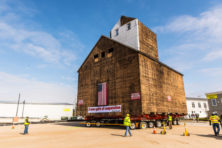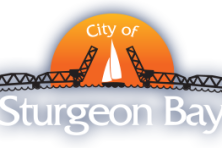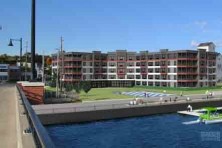Sturgeon Bay Council Overrides Mayor’s Veto
- Share
- Tweet
- Pin
- Share
During Mayor Thad Birmingham’s final meeting, the Sturgeon Bay Common Council voted to override one final veto.
Birmingham had vetoed the development agreement agreed to by the council March 19, saying that the agreement reached between the city and the Sturgeon Bay Historical Society left the city vulnerable to taking on additional costs or being left with an unusable structure.
In the agreement, the city accepts the historical society’s donation of the grain elevator and up to $1.25 million to restore it and move it back to its original location on the west-side waterfront. It also sets aside a $130,000 operation and maintenance fund which would be used to raze the elevator if the historical society falls short in any of the obligations it agrees to.
The mayor argued that given the contentiousness of the structure, the city would be unlikely to be able to raze it without a battle. He also cited the potential costs of building bathrooms, creating parking and making landscaping improvements.
Alder Kelly Catarozoli, also participating in her final meeting as a council member, reveled in the opportunity to object to the mayor’s position one last time.
“There is no free, in perpetuity, public improvement that we’re going to get,” she said. “If what you’re saying is we don’t want any sort of improvement that we’re going to have to pay anything for, then we’re never going to have anything – not even grass we’re going to have to mow.”
She also objected to Alder David Ward’s objections on the basis that there’s no permanent plan for the use of the structure.
“They’re trying to be flexible,” she said. “They are saying that if you decide to put an ice rink in, we will adjust this to fit that.”
Previously in the meeting, the council unanimously agreed to allot up to $150,000 to extend a bike path at Tacoma Beach Road – something not lost on Catarozoli.
“We just approved a bike path for $150,000, and nobody balked at that,” she said.
First Reading of Code of Ethics, Code of Conduct
The council had initial discussions about a new code of conduct and code of ethics for its members. The codes were developed over many months by the Community and Protection Services Committee.
Ward asked for clarification of some language in the policy, which was modeled after codes used in Suamico and several other communities near Green Bay. He also questioned whether the council should move the recommendations forward right before the makeup of the council would change dramatically after the results of that night’s election.
Outgoing Alder Barbara Allmann said approval would send a strong message to the community.
“Part of it is to let everybody know that we take this seriously,” she said. “To hold ourselves to a level of conduct that is admirable.”
Mayor’s Farewell
Birmingham took a moment at the end of the meeting to thank city staff, present and past councils, and his family for their support during his nine years as mayor.
After the meeting, Birmingham said he was proud of the many developments and improvements that occurred during his tenure, from expansion of the industrial park, to Sunset Park and Little Lake improvements, to keeping the Mobile Bay in the city. He also said he has no regrets about his often-contentious tenure and said there’s nothing he would have done differently in the five-year fight over the future of the west-side waterfront.
“I think we, in hindsight, we probably put too much reliance on the DNR,” he said. He said he is disappointed that “they have taken every step they can to not make a decision down there.”
The mayor repeated his insistence that the legislature or the state Supreme Court will rule on how an Ordinary High Water Mark is determined on filled land, indicating that he believes development of the west waterfront is still in play despite multiple DNR rulings that put much of the property in the public trust.



